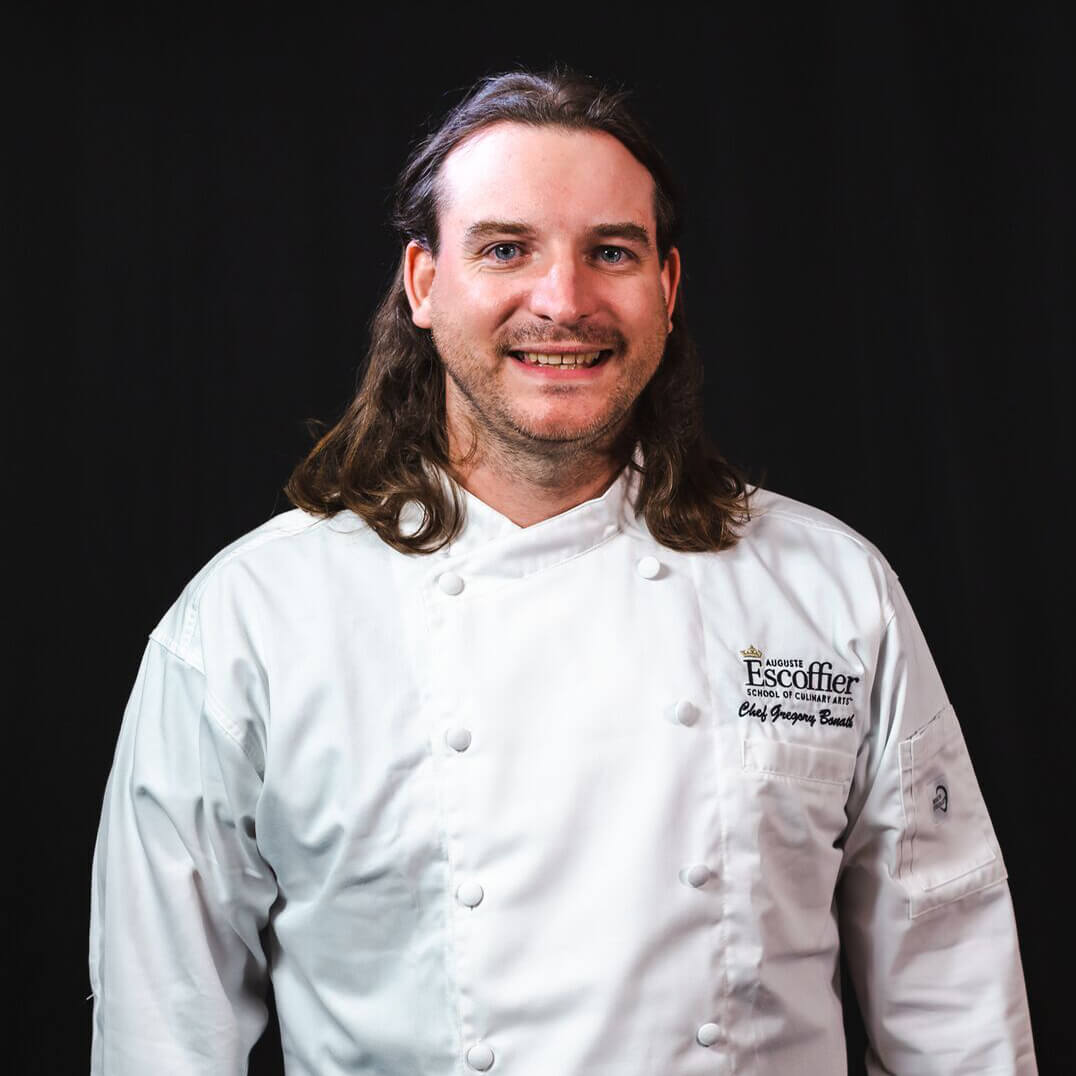Listen to This Article:
Growing up among leafy foothills overlooking the placid waters of Lake George in Upstate New York, Escoffier Lead Chef Instructor Gregory Bonath could not have anticipated the great career journey ahead of him.
However, with the encouragement of his family and mentors, and guided by a deep commitment to pushing his limits and broadening his horizons, Chef Gregory would go on to leave his hometown and embark on a decades-long career traveling the country and working for some of the world’s most prestigious hospitality brands.
We don’t always know where our lives and careers will take us—but with an open mind and a willingness to embrace new challenges, we allow ourselves to learn, grow, and achieve things we may not have thought possible.
Follow Chef Gregory as he recounts his path from summer dishwasher to culinary industry veteran, and finally to becoming an educator helping train the next generation of culinarians.
“The World Is Huge”
Chef Gregory’s introduction to the world of food and hospitality came early. While his hometown of Bolton Landing, New York is tiny, its location on the shores of Lake George places it in the heart of a major Northeast tourist destination.
His mother owns a bed and breakfast there, and his family was strongly tied to the culinary traditions of their Polish roots. “Everybody says that their grandmother was the best cook ever—but honestly, my Babci was,” he remembers. “Going to her house was such a joy—every time you went, she had something good.”
Through his family—his mother and Babci in particular—Gregory became convinced that he wanted to pursue a culinary career. He spent summers dishwashing in kitchens until he landed a position carving meat on the buffet at the Sagamore, a renowned Lake George resort that dates back to the late 19th century.

Chef Gregory began his culinary journey at the historic Sagamore, on the shores of Lake George. (Image source)
For a seventeen-year-old, landing a position at the Sagamore was already an accomplishment. But in addition to exposing him to food and hospitality, his family also imparted another powerful influence—curiosity. “My parents always said, ‘You’re from Bolton Landing. The world is huge. Go out and see as much as you can, do as much as you can—just expose yourself to all of it.’”
Taking those words to heart, Gregory set his sights beyond his small town. The Sagamore had an externship partnership with a nearby college’s culinary arts program, which he wound up attending. That experience, he says, solidified his goals—both to pursue hospitality and to broaden his horizons. “At school, you start to learn more about global influences—food from different regions, different areas, different countries. That made me really want to see more in life.”
Taking a Shot at a Unique Opportunity
After graduating, Chef Gregory began searching around for his next move. With the encouragement of some mentors, he put in an application to serve as the opening sous chef for a new resort, The Great Escape Lodge, also in Upstate New York. After a long interview process, he was hired for the role—and immediately found himself immersed in the construction and development of the project, which was being built from the ground up.
“When I was going through the interview process, it was literally just a patch of dirt,” Chef Gregory recounts. “By the time I was moving on, it was up and running with three food outlets.” In that position, he was involved in planning food and beverage menus, hiring staff, and more—in other words, he was hands-on with everything necessary to get the resort off the ground.
It was a unique opportunity to work in an uncommon culinary position—and his choice to try his hand at it led directly to the next decade of his career.
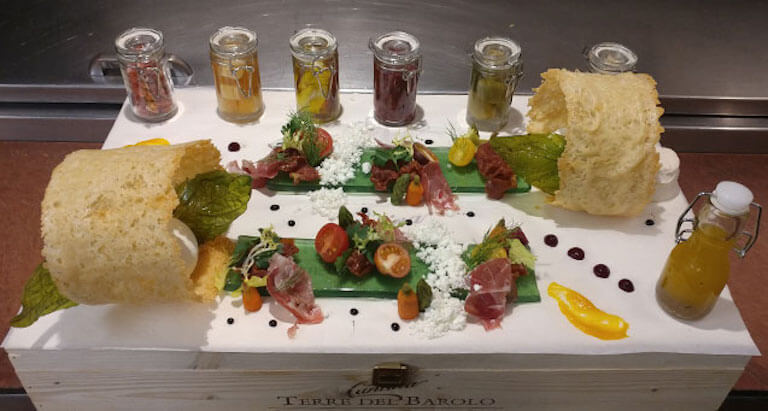
Chef Gregory’s contributions spanned everything from restaurant design to determining how dishes should be plated.
How the Food Gets To the Plate: Building Hospitality from the Ground Up
From The Great Escape Lodge, Chef Gregory went on to work for major hospitality companies, like Hyatt and Loews, on hotel openings and renovations all around the country, serving as banquet chef, senior sous chef, and chef de cuisine on major projects in New Jersey, Minneapolis, the Orlando International Airport, and downtown Boston.
Chef Gregory’s success in this niche was a result of a specific skill set he developed over the years, which spanned everything from the earliest stages of planning a restaurant to the actual day-to-day practice of running one.
“In the beginning,” he explains, “it’s all about construction—understanding fire codes, capacity, fire suppression systems, emergency exits, equipment planning, where the gas lines and water are going to go. It’s really getting into planning and understanding what you can actually do with the space you’re allotted.”
From there, the focus transitions to operational decisions, like what kind of plates, linen, and cutlery to purchase, how many staff to hire—and, of course, what’s going to be on the menu.
Once the menu is established, Chef Gregory says, the focus shifts to making sure it’s sustainable. “We have to make sure all the costs are efficient and set up a training guide. We make every dish with everybody—multiple times—taking photos of it, making sure the recipe cards are tweaked correctly, the portion sizes are correct…”
Then, after the restaurant opens, it takes about a year to, in Chef Gregory’s words, “iron out the details and get it to a place where it’s up and can sustain itself. And then you leave, and go and do the same thing elsewhere.”
A Local-First Perspective on Food
Throughout his travels around the country, two things stayed consistent for Chef Gregory—making guests feel welcome and comfortable, and showcasing regional ingredients and culture with a local-first perspective on food. Whether guests were visiting his restaurants from one mile away or one thousand, his priority was giving them an opportunity to experience the best of what the region had to offer.
“There’s a balance between what is comfortable and recognizable for everybody,” he says, “while also really displaying what is special about that region, food-wise and tradition-wise and culture-wise. You want to honor that tradition and culture and put those special items on your menus. But you also have to make it approachable.”
Whether that be the Scandinavian traditions of Minnesota, international influences of Orlando, or the famous heirloom tomatoes of New Jersey, his goal was to express the uniqueness of each region on every plate he delivered. That focus on the guest’s experience is a big part of why presentation became a key aspect of his approach to cuisine. “People eat with their eyes,” he believes, which is why “I always try to think about the person that’s getting the plate, or walking up to the buffet… What are they going to think? You want to make the presentation a part of their experience.”
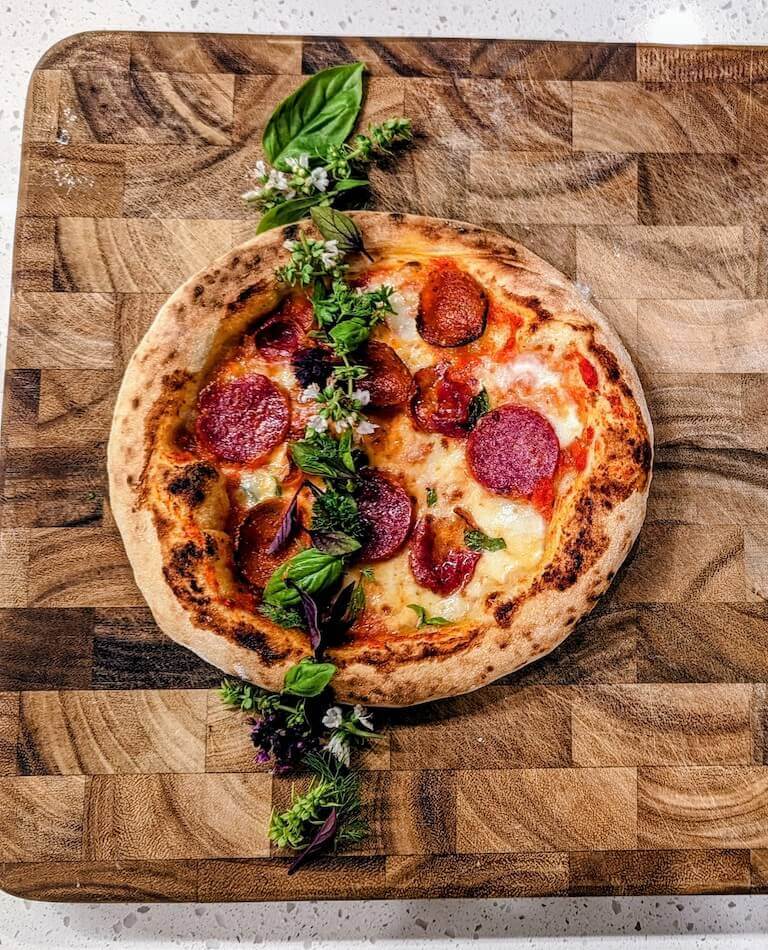
Chef Gregory believes that the way a dish is presented is a key part of the dining experience.
Having been involved in designing beverage menus throughout his career, highlighting regional beverage offerings was equally important to Chef Gregory; he was always looking out for great pairings of local food and drink to further elevate the experience and bring a local touch that allowed people to connect with the fundamental social aspect of eating and drinking together—no matter where in the world they were.
At the top of his game, amid a challenging and successful career, Chef Gregory’s curiosity reared its head once again, setting him down a new path.
An Epiphany Leads to a New Trajectory
After many years of working in hotels, Chef Gregory began to feel he was ready for a change of pace. He and his fiancée were soon to be married and thinking of starting a family, so he was interested in making career moves that would allow him to be more present for his children.
First, they relocated to coastal Delaware, and he transitioned to corporate catering. While this brought welcome changes to his lifestyle—“corporate cafeteria has a much better schedule than any other food and beverage job ever,” he notes—he was still looking for something that could allow him additional flexibility while also taking advantage of the skills he had built up over his career.
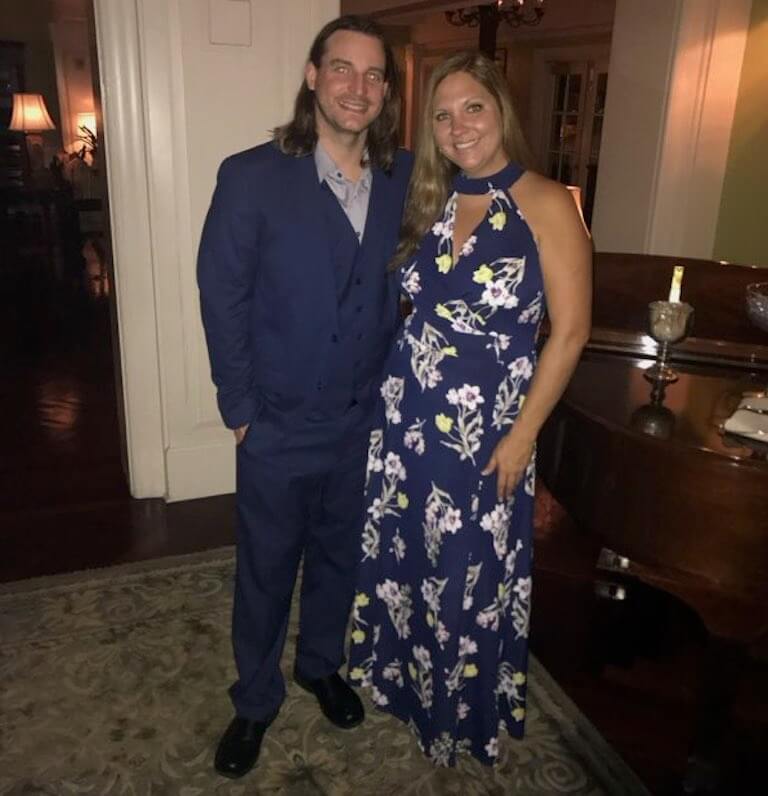
Chef Gregory’s interest in focusing on family spurred an important shift in his career.
As he began to explore other paths, it dawned on him that he had a skill set that he hadn’t quite considered up to that point—training and education.
“When I was in hotels,” Chef Gregory says, “I didn’t realize how much we were educating people. But you’re teaching something all the time.” He finally did realize it, though, after he had transitioned to corporate cafeterias; he recalls the excitement on the faces of some of his staff when showing them how to carve a palm tree out of a cantaloupe.
“Seeing people’s eyes light up when they see something they hadn’t seen before—that was my spark moment of realizing education’s effect on people. Just having the opportunity to work with them and show them small things, like a better way to cut a vegetable or smarter ways to store your produce—that’s when I started to realize, ‘Wow, this does have a huge impact.’”
So, he began searching for opportunities to get into the field of culinary education—which led him to Escoffier, first as a Chef Evaluator, then as a Chef Instructor, and finally as Lead Chef Instructor, the position he holds today.
Learning Is Never Finished
Always one to keep broadening his horizons and embracing new challenges, Chef Gregory made a commitment to further his own education at the same time he began working to educate others. And he chose to do so in an area that had been a part of his life from the earliest stages of his career—beverage.
Though he already had years of hands-on knowledge and experience under his belt, he had never had any formal training. Fascinated by the nuanced production and ancient cultural significance of wine, he began his efforts there, studying for what would be the first of several awards he’d earn through the Wine and Spirit Education Trust—one of the world’s leading beverage education and certification entities.
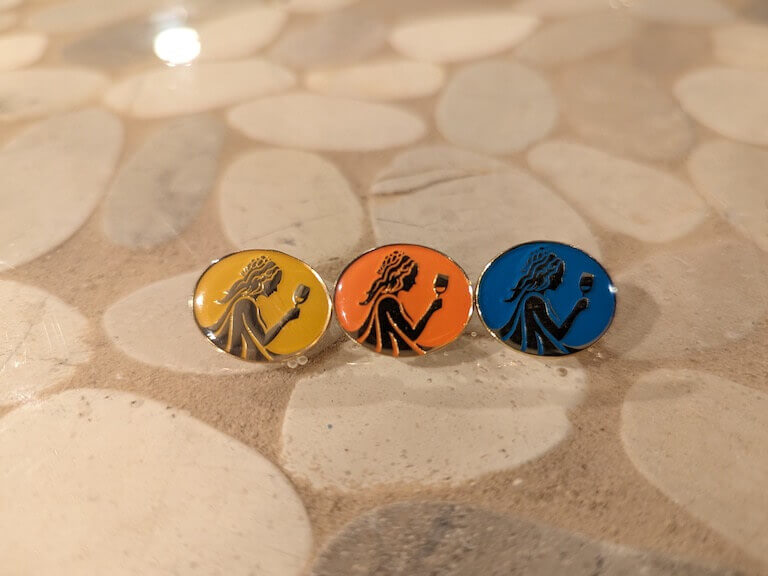
Chef Gregory’s WSET award pins are a formal recognition of his experience working with beverages throughout his career.
“I always thought it was so interesting just how much goes into a glass of wine—from the makers, from the grapes, from the soil, the rain levels, the moisture and fog…that definitely sparked my interest.” He began with the WSET Level 1 award, then immediately moved on to the Level 2 award, which he obtained with distinction. He has since also obtained a Level 1 award in sake, and has plans to pursue further awards in spirits and beer as well.
For Chef Gregory, now a certified sommelier, these awards represented the opportunity to formalize the knowledge and experience he’d obtained throughout his career. “I really appreciated—having put together a career working with beverage—actually solidifying that with a certificate; having something to hang on the wall definitely made everything feel like it came full circle.”
“See as Much as You Can”
Chef Gregory’s efforts to obtain those WSET awards tie in with his broader approach to life, experience, and learning—which is defined by the commitment to broadening horizons, accepting challenges, and welcoming opportunities to gain, and share, culinary knowledge.
He firmly believes that every experience is a learning opportunity—and that, in working relationships, that opportunity goes both ways. Reflecting on his career, Chef Gregory says, “One thing I learned really quickly is that, in any working relationship, you learn from them, and they learn from you. Even if you’re in a mentor role, you’re not just teaching them all the time—you’re learning from them the exact same amount they’re learning from you.”
He cherishes the experiences he’s had throughout his career working all across the country with people of different ages, cultures, backgrounds, and experience levels, exchanging knowledge and experiences along the way. He brings this same learning mentality to his role at Escoffier, where he works to help students turn their culinary education into their culinary dreams—just as his own culinary education helped him to do.
When it comes to the advice he has for students, it all ties back to the same advice his Babci and his parents gave him when he was a kid in Bolton Landing. “There’s just so much out there in food—in a recipe, in a culture, in a cuisine, in a beverage. Try to learn all of it. As impossible as that may seem, that’s kind of the beauty of it—when you realize, ‘Wow, there are 10,000 things I didn’t even know existed.’ So I would say, always try to learn as much as possible about all of it. See as much as you can.”
How Curiosity Can Craft Careers
From growing up in a tiny town to working with international hospitality brands, Chef Gregory’s curiosity and passion for experience has pushed him to keep growing and learning—even as he’s transitioned to a career focused on educating others.
In addition to his family’s early advice and the patience and support of the invaluable mentors who believed in him along the way, he also credits his culinary education for inspiring him to continue to seek and accept challenges throughout his life.
If you’re interested in learning more about what a culinary education could mean for you, consider reaching out to our Admissions Department for more information.
Financial aid, grants, and scholarships are available to those who apply and qualify, which could mean that pursuing a culinary education may be more attainable than you think.
DID YOU ENJOY THIS ARTICLE? TRY ONE OF THESE NEXT!
- Chef Instructor Eric Jenkins’ Journey From Farm House to White House
- Cooking Up Resilience: How Five Culinary School Graduates Turned Challenges into Triumphs
- Who Was Auguste Escoffier? The Story Behind the King of Chefs
*Information may not reflect every student’s experience. Results and outcomes may be based on several factors, such as geographical region or previous experience.

